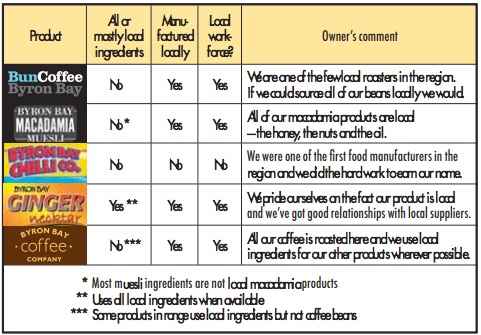
WALK INTO any local supermarket or grocery store and you’ll see at least a dozen products proudly emblazoned with the name ‘Byron Bay’.
Their colourful labels weave images of rich soil, sun-drenched hillsides, and local producers with authentic, personal connections to the land.
Motivated by a desire to be healthy and to support local, sustainable food production, many of us gravitate towards these products as a matter of course, proudly filling our baskets and trolleys with food and drink bearing the Byron brand.
But just how local are they?
An investigation by The Echo has revealed that while most products using the Byron name have some local connection, there is a serious lack of clarity about where the ingredients come from and whether the product is actually made in the Shire.
[xyz-ihs snippet=”Servo”]
It has also emerged that, under Australia’s labelling laws, companies are not required to say how ‘local’ their products are, and are only likely to face penalties in cases of blatant deception.
‘It’s a timely reminder that consumers should always read the fine print,’ says Stefanie Meyers, a spokesperson from the consumer watchdog Choice.
[xyz-ihs snippet=”SMC01″]
‘Associating a product to a particular geographical region leads consumers to believe that such products hold a unique benefit when compared to what else is in the market,’ she says.
‘Whether claiming it’s grapes from the Barossa Valley or coffee beans from Byron Bay, consumers will always pay a premium for a product which boasts superior credentials.’
![]()
Story by Echonetdaily
Read Echonetdaily’s full story here